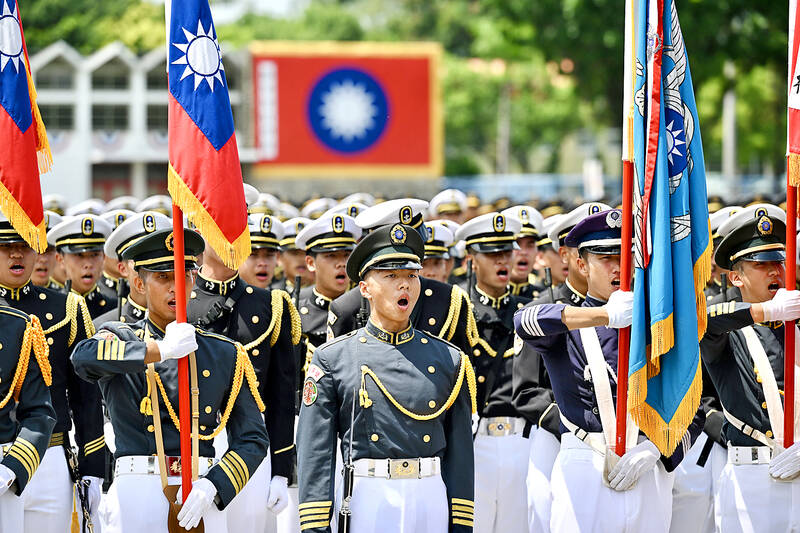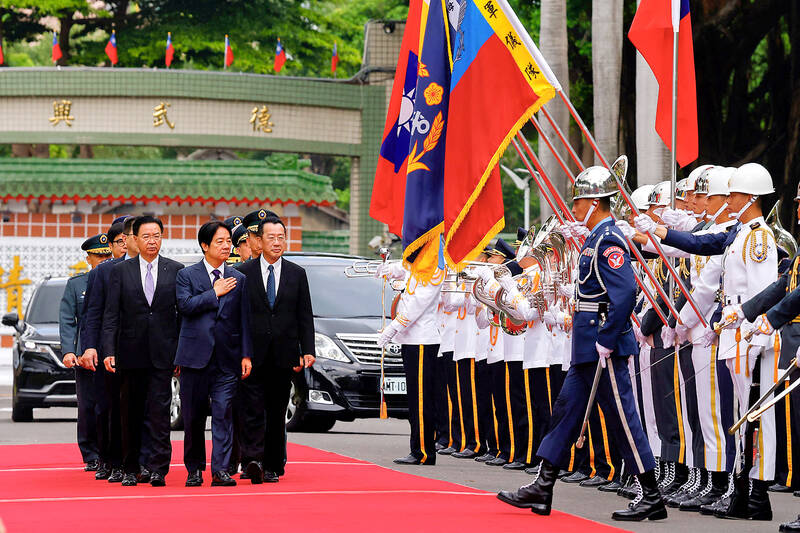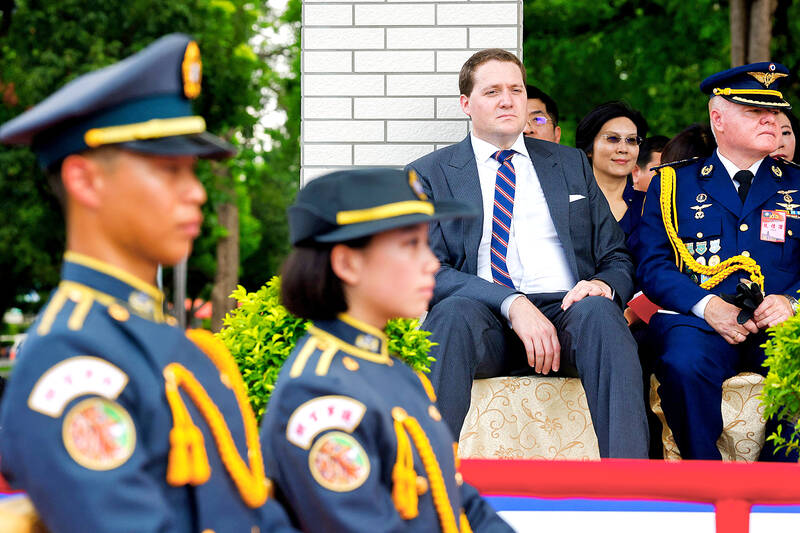President William Lai (賴清德) yesterday told students and alumni at the Republic of China Military Academy centennial in Kaohsiung that they must know their enemy and resist defeatism.
In a ceremony to celebrate the founding of the Whampoa Military Academy on June 16, 1924, in Guangzhou, China, Lai highlighted the importance of defending the nation’s sovereignty, making sacrifices and staying united.
“No countries can exist without sovereignty, and the Republic of China can only exist if Taiwan exists. You [the students] are here at the academy as you have pledged to defend the nation,” he said. “We should distinguish friend from foe, and should never accept a defeatist attitude that says our first battle with the enemy would be the last.”

Photo: Lo Pei-de, Taipei Times
He appeared to be referencing remarks by former president Ma Ying-jeou (馬英九), who in 2020 said in a speech that China’s strategy is to mount a rapid invasion of Taiwan, leaving no time for the US to come to the nation’s rescue.
The academy was relocated to Taiwan after the Chinese Civil War and reopened in Kaohsiung as the Republic of China Military Academy. As the Chinese People’s Liberation Army recruited graduates from the original academy, both nations held centennials to assert ownership of the institution’s heritage.
More than 10,000 active and retired officers had been expected at the event in Kaohsiung, while fewer than 100 were forecast to attend China’s version in Huangpu, also known as Whampoa, Veterans Affairs Council Minister Yen De-fa (嚴德發) had said.

Photo: Ann Wang, Reuters
In Kaohsiung, students marched in step in a formal military parade — the first Lai has reviewed since taking office on May 20.
Legislative Speaker Han Kuo-yu (韓國瑜), National Security Council Secretary-General Joseph Wu (吳釗燮), Minister of National Defense Wellington Koo (顧立雄) and foreign dignitaries also attended the event.
Lai said he was honored to preside over the centennial as commander-in-chief.

Photo: Ann Wang, Reuters
“The academy was established at a time when the country was in danger and was pressed on both domestic and international fronts. For a democratic republic of the people, by the people and for the people, young people joined the academy to fight wars to unite the nation, suppress communists and withstand the Japanese invasion. They were undaunted by hardships, difficulties and death,” Lai said.
Although the academy was relocated to Taiwan in 1949 following the Chinese Nationalist Party’s (KMT) loss to the Chinese Communist Party in the Chinese Civil War, it resumed operations in 1950 and defended Taiwan in the Second Taiwan Strait Crisis in 1958 and other conflicts, he said.
Students of the academy have also helped rebuild the nation after natural disasters, he added.
“Despite drastic changes over the past 100 years, we firmly believe that wherever the Republic of China is, there is the spirit of Whampoa... It is here that the spirit of Whampoa continues and prospers. Only those who would fight for the survival, development and security of the Republic of China and its people are true graduates of the academy, and those who have no such ambition are false ones,” he said.
The greatest challenge the academy’s students and graduates face is the rise of China and its intention to disrupt the “status quo” in the Taiwan Strait by annexing Taiwan and destroying the Republic of China, he said.
“Your highest commission should be to bravely defend Taiwan and maintain peace and stability across the Taiwan Strait,” he said.
Academy graduates need to realize they do not belong to any individual or political party, as they have pledged allegiance to the country, people and democracy, he said.

MAKING WAVES: China’s maritime militia could become a nontraditional threat in war, clogging up shipping lanes to prevent US or Japanese intervention, a report said About 1,900 Chinese ships flying flags of convenience and fishing vessels that participated in China’s military exercises around Taiwan last month and in January last year have been listed for monitoring, Coast Guard Administration (CGA) Deputy Director-General Hsieh Ching-chin (謝慶欽) said yesterday. Following amendments to the Commercial Port Act (商港法) and the Law of Ships (船舶法) last month, the CGA can designate possible berthing areas or deny ports of call for vessels suspected of loitering around areas where undersea cables can be accessed, Oceans Affairs Council Minister Kuan Bi-ling (管碧玲) said. The list of suspected ships, originally 300, had risen to about

DAREDEVIL: Honnold said it had always been a dream of his to climb Taipei 101, while a Netflix producer said the skyscraper was ‘a real icon of this country’ US climber Alex Honnold yesterday took on Taiwan’s tallest building, becoming the first person to scale Taipei 101 without a rope, harness or safety net. Hundreds of spectators gathered at the base of the 101-story skyscraper to watch Honnold, 40, embark on his daredevil feat, which was also broadcast live on Netflix. Dressed in a red T-shirt and yellow custom-made climbing shoes, Honnold swiftly moved up the southeast face of the glass and steel building. At one point, he stepped onto a platform midway up to wave down at fans and onlookers who were taking photos. People watching from inside

Japan’s strategic alliance with the US would collapse if Tokyo were to turn away from a conflict in Taiwan, Japanese Prime Minister Sanae Takaichi said yesterday, but distanced herself from previous comments that suggested a possible military response in such an event. Takaichi expressed her latest views on a nationally broadcast TV program late on Monday, where an opposition party leader criticized her for igniting tensions with China with the earlier remarks. Ties between Japan and China have sunk to the worst level in years after Takaichi said in November that a hypothetical Chinese attack on Taiwan could bring about a Japanese

The WHO ignored early COVID-19 warnings from Taiwan, US Deputy Secretary of Health and Human Services Jim O’Neill said on Friday, as part of justification for Washington withdrawing from the global health body. US Secretary of State Marco Rubio on Thursday said that the US was pulling out of the UN agency, as it failed to fulfill its responsibilities during the COVID-19 pandemic. The WHO “ignored early COVID warnings from Taiwan in 2019 by pretending Taiwan did not exist, O’Neill wrote on X on Friday, Taiwan time. “It ignored rigorous science and promoted lockdowns.” The US will “continue international coordination on infectious